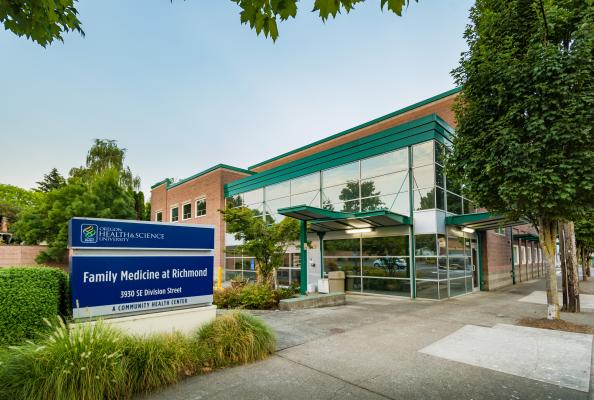OHSU Primary Care Clinic, Richmond
This clinic includes Family Medicine providers.
For medical emergencies, call 911 or go to the nearest emergency room. OHSU’s Primary Care clinics do not provide emergency care.
We welcome and treat Southeast Portland residents even if you can’t pay or don’t have insurance. We provide primary care for all ages and genders:
- Wellness and prevention care
- Treatment for minor injuries and common illnesses
- Management of chronic conditions, like diabetes and high blood pressure
- Behavioral care
We’ll ask about your household size and income. We’ll give you a discount based on that information.
We take Medicaid and Medicare. If you have other insurance, it’s best to ask your insurer if they cover our care.
This clinic and OHSU Immediate Care Clinic, Richmond make up Richmond Family Health Center, a Community Health Center and Federally Qualified Health Center.
Services:
- Addiction care (medication-assisted treatment)
- Adolescent (teen) care
- Adult care
- Behavioral care/mental health and wellness care
- Family medicine
- Gender-affirming primary care
- Hepatitis C care
- Laboratory
- Naloxone (Narcan) kits to prevent overdoses
- Nurse care coordination
- Pharmacy
- Pregnancy care
- Same-day appointments
- Senior care
- Sports medicine
- Women’s health care
- X-rays
- Virtual visits
—
If you need language support: We can connect you with qualified interpreters. We have materials you can use to show us your language.
언어 지원이 필요한 경우: 자격을 갖춘 통역사와 연결해 드릴 수 있습니다. 저희는 귀하의 언어적 소통을 위해 필요한 지원을 제공할 준비가 되어 있습니다.
Якщо вам потрібні послуги перекладача: Ми зв'яжемо вас із кваліфікованими перекладачами. У нас є матеріали на вашій рідній мові для вашого користування.
إذا كنت بحاجة إلى دعم لغوي: يمكننا توصيلك بمترجمين فوريين مؤهلين. لدينا مواد يمكنك استخدامها لتوضح لنا لغتك.
Haddii aad u baahan tahay taageerada luuqada: Waxaan kugu xiri karnaa turjumaano aqoon u leh. Waxaan heynaa macluumaad aad isticmaali karto si aad noo tusto luuqadaada.
Если требуется сопровождение на предпочитаемом языке: Мы можем предоставить квалифицированных устных переводчиков. У нас есть материалы, которые вы можете использовать, чтобы сообщить нам информацию на своем языке.
如果您需要语言方面的支持:我们可以为您找到具有资质的口译员。我们有相关材料可供您使用,以便您向我们指出您的语言。
Nếu quý vị cần hỗ trợ về ngôn ngữ: Chúng tôi có thể kết nối quý vị với các thông dịch viên có đủ trình độ. Chúng tôi có tài liệu mà quý vị có thể sử dụng để thể hiện ngôn ngữ của quý vị.
Si necesita apoyo lingüístico: Podemos ponerlo en contacto con intérpretes calificados. Tenemos materiales que puede usar para mostrarnos su idioma.
—
Get involved
You can ask to join:
- A board of directors that helps run Richmond Family Health Center. The board is a mix of patients and community members.
- A patient advisory council that helps improve our services.
Visit or call us to learn more.
—
- Plan your trip on TriMet
- Bike share: Find a Biketown hub
—
After hours: If you are a current patient with an urgent issue, call 503-418-3900 to speak to a provider. If you are having a medical emergency, call 911.
Map
Hours

Address
- Plan your trip on TriMet
- Bike share: Find a Biketown hub
OHSU building
Parking
ParkingContact
Parking
Free parking is available at the Richmond Family Health Center which houses the Richmond Primary Care Clinic.
Providers at OHSU Primary Care Clinic, Richmond
-
- Alexa E. Ariazi, D.O. (she/her/they)
- Family medicine doctor
-
- Keevin Bybee, M.D. (he/him)
- Family Medicine Doctor
-
- Adrienne Cardiel, M.S.W., LCSW (she/her/hers)
- Licensed clinical social worker
-
- Ceili Charley, M.D. (she/her)
- Family medicine doctor
-
- Cliff Coleman, M.D., M.P.H.
- Doris and Mark Storms Chair in Compassionate Communication
-
- Debra Diaz, MSHS, PA-C (she/her)
- Family Medicine Physician Associate
-
- Sara Emamian, M.D., M.P.H.
- Resident Physician, Family Medicine
-
- Kristin Erickson, M.S.W., LCSW
- Behavioral Health Consultant, Department of Family Medicine
-
- Miles Fletcher, M.D. (he/him)
- Resident Physician, Family Medicine
-
- Allison Fox, M.S.N., FNP
- Family Nurse Practitioner
-
- Kendyl Garrow, M.S.W., LCSW
- Behavioral Health Consultant
-
- Courtney Janice Lauer, PA-C (she/her)
- Family Medicine Physician Assistant
-
- Clara Ledsky, M.D. (she/her)
- Resident Physician, Family Medicine
-
- Christina Milano, M.D.
- CoFounder & Medical Director, OHSU Transgender Health Program
-
- Nicholas Nowell, M.D.
- Resident Physician, Family Medicine
-
- Anastasiia Savchenko, D.N.P. (she/her)
- Adult-Gerontology Primary Care Nurse Practitioner
-
- Sabrina Jamileh Sayegh, M.D. (they/them)
- Family medicine doctor
-
- Shannon Smith, PMHNP-BC, M.P.H. (he/him)
- Psychiatrist
-
- Lindsay Thimmig, M.D.
- Family Medicine Doctor
-
- Lara Westbrook, M.D. (she/her)
- Resident Physician, Department of Family Medicine
-
- Katie White, M.S.W., LCSW, MAC
- Behavioral Health Consultant